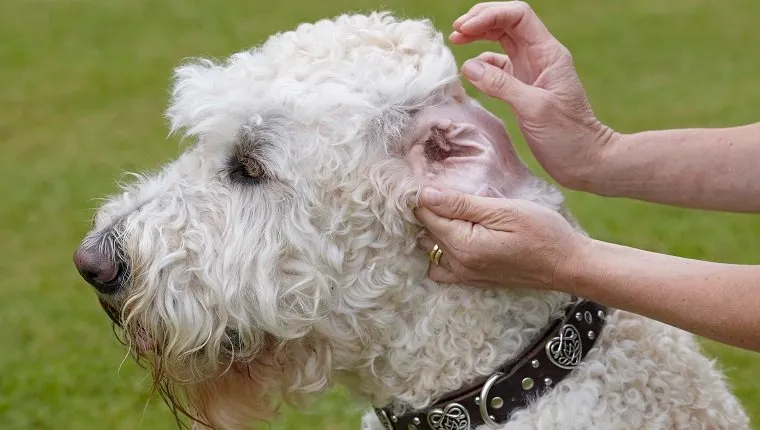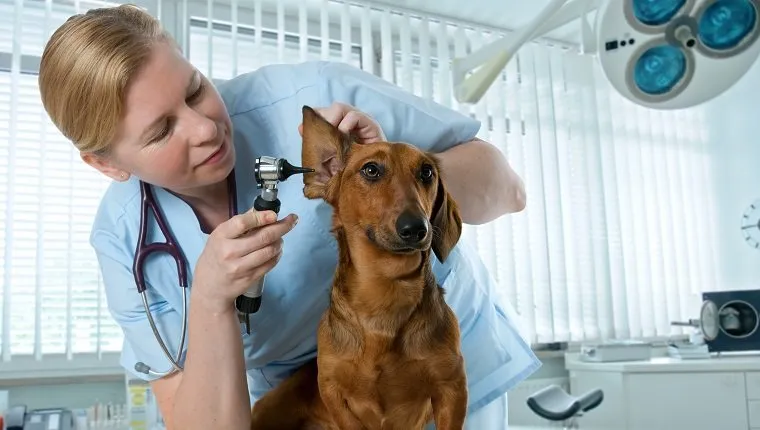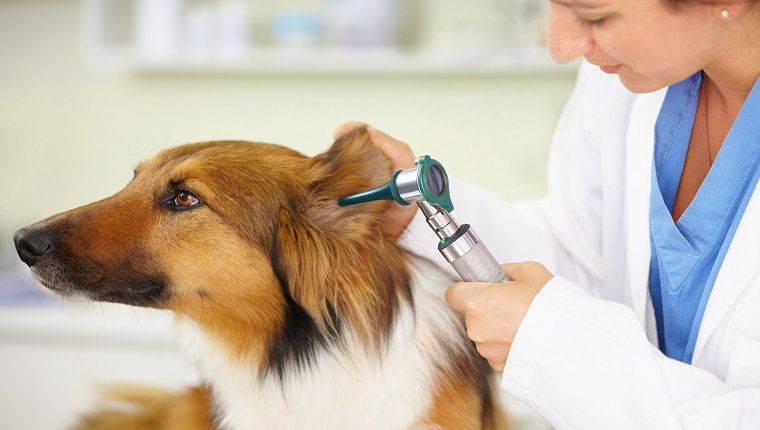All dogs shake their heads from time to time, but when head shaking becomes excessive, it can be alarming. Most dogs will shake to relieve minor itches or irritation; however, if head shaking persists, it’s a cause for concern.
If your pup is shaking their head too much, they’re likely having a problem with their ears, and it may be time for a trip to the veterinarian. When left untreated, conditions that cause your dog to shake their head may lead to deafness, ear drum rupture, further infection and injury, or illnesses.
Here’s what your dog’s head shaking can mean and what you can do about it.
Ear Damage Or Blockage

Sometimes a foreign body can get lodged in your dog’s ear.
Grass awns, which are sharp grass seeds that can burrow into the skin, have been known to damage dogs’ ears. Insects like flies may also bite at the ears, causing wounds or soreness.
Allergens can also find their way into the ear canal and cause irritation. Wax buildup can create a blockage of the ear that results in discomfort.
Many things can damage or block the ears, which is why it’s important to examine your dog’s ears if you notice excessive head shaking. Look for sores, foreign bodies, and blockages, and see a vet if you notice anything out of the ordinary.
Your vet will likely be able to do a simple ear flush if there’s no sign of infection. If the head shaking continues after the object of discomfort is removed, there’s likely another issue or further infection causing the behavior.
Otitis

Otitis externa is an inflammation of the external ear canal that can be caused by a number of things, including mites, wax, or grass awns. Most of the time it’s caused by an allergy.
The inflammation allows bacteria and yeast to build up in the ear canal, which can cause a secondary infection.
With otitis externa, the ears may look red and swollen and become sensitive to touch. Your dog may experience relief or pain when you massage their ears. You may notice a bad odor coming from the ears, too.
You’ll need to take a trip to the vet. The treatment usually involves a topical antibacterial, anti-yeast, and antiseptic after a thorough cleansing of the ears.
Your vet may also prescribe a steroid to reduce swelling along with oral antibiotics or antifungal medication. Once the inflammation is cleared out, you’ll likely have to keep the ears clean to prevent it from returning.
Failure to treat this may result in deafness, further infection, or other illnesses.
Ear Vasculitis

Ear vasculitis is an inflammation of the blood vessels in the pinna or ear flaps. Certain breeds, including Dachshunds, Collies, Shetland Sheepdogs, German Shepherds, and Rottweilers are more prone to developing the condition, though any breed can suffer from it.
It can be caused by immune disease, frostbite, fly bites, bad drug or vaccine interaction, food allergies, tick-borne illnesses, or other environmental factors.
You may notice purple or red dots on the skin, fluid filled vesicles under the skin, ulcers, swelling of the legs, or other symptoms. Lesions may form that break and bleed when your dog shakes their head.
This is cause for an immediate trip to the vet. Treatment will likely include antibiotics if the condition is caused by bacterial infection, lifestyle changes if the cause is allergies, or medication that suppresses the immune system response that’s causing the condition if the culprit is immune disease.
Follow-up exams will be necessary.
Hematomas

Hematomas can actually be caused by the head shaking itself. If the condition that causes your dog to shake their head isn’t treated quickly, all that head shaking can result in the formation of blood blisters, called hematomas, as the ear flaps slap against the skull and rupture blood vessels in the pinna.
This can lead to even more head shaking and more hematomas in a dangerous cycle.
While hematomas heal on their own, it can take weeks of discomfort, and unless the initial cause of the head shaking is treated, they will continue to form.
The important thing is to treat the initial condition that caused the head shaking to start in the first place as well as the hematoma.
Your vet may drain the hematoma with a needle or move on to surgical treatment. Often, the vet will bandage the ear so that the flap can’t continue to hit the ear and cause new hematomas.
They may also give your dog an Elizabethan collar — the “cone of shame” — to prevent scratching and further damage.
Injury, Head Trauma, Or Chemical Exposure

If your dog has suffered a recent injury, especially to the head, it can cause discomfort or affect their balance, and they may shake to relieve the symptoms. This can also happen if your dog has recently experienced a stroke, inner ear infection, or vestibular syndrome.
Chemicals or toxins can affect the nervous system and result in unusual behavior, as well. If you notice other symptoms like temporary blindness, toxic chemicals may be to blame.
It’s important for you to see a vet in any of these cases. A minor injury may heal on its own, and the head shaking may stop. However, it’s very hard to find that out without running tests.
If you suspect chemical exposure, you should get to the vet immediately or call the ASPCA National Animal Poison Control Center at 888-426-4435 and follow their instructions.
Has your dog ever started shaking their head a lot? What did you do for treatment? Let us know in the comments below!









